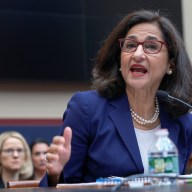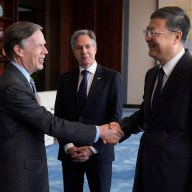Clementine Igilibambe is a local survivor of the 1994
Rwandan Genocide. She left Rwanda when she was eight years old, on foot, to
the Congo. Several months later she and her family moved to a refugee camp in
Kenya where they spent five years struggling to survive until they moved to
Dayton, Ohio. After attending the University of Dayton and graduating last
May, Igilibambe moved to Boston and now works with the Cambridge Economic
Opportunity Committee where she does community organizing mainly for people in
public housing.
What was it like when you got to America?
Living in a place where you get to have freedom, and go to
school without looking behind your back, and your parents will come home from
work alive, and there will be food on your table every day that was huge for me
and my family. That was something you’re not guaranteed to have when we lived
back in Africa.
How/Why did you come to America?
Because America is the land of opportunity. My uncle lived
here, he went to school here, moved in 1989 or 1990, moved here before the
genocide took place in our country. He helped us to apply. It’s really,
really hard to get accepted to go to America, we applied five times, every year
we got rejected. Kept praying and hoping and applying, finally they told us if
you apply again we are going to send you back to Rwanda. Thought maybe this is
not going to work. Because going to Rwanda meant you were basically done. We
kept praying and never applied again. After two days of receiving a rejection
letter we received an acceptance letter. Don’t know how it worked. We were
going to America in two days. It was so fast we don’t even know how that
happened, but we made it.
So many refugees are still trying to get in the US but it is
really, really hard. What’s sad is that they get here and still can’t afford
to go to school. We have all these expectations and dreams when we are told we
are going to the US. Then you get here and life isn’t really that easy.
People back home think that as soon as you get here you’re a millionaire.
What was Rwanda like? Your most vivid memories?
I haven’t really forgotten anything. I remember everything
that happened in Rwanda. The movie, “Hotel Rwanda,” is a replica of everything
I went through.
I remember everything from when I was in bed and one of my
maids came to wake me up and told me I had to leave and I said “no” today’s
Saturday I’m not going to school; to hearing bombs; to getting up and going
outside and seeing body parts all over the place. I remember walking from
Rwanda to Congo on foot for two days, not knowing where my parents were for two
weeks when I lived in a forest, to finding them and moving to a refugee camp;
to getting cholera, and all my friends that I left during the war.
I don’t have any childhood best friends. They all died. I
had to start a new first life when I left Rwanda.
I could hear bullets and bombs but I thought it was all a
dream so I kept sleeping. Then (my maid) came and dragged me outside. My mom
was already outside, she was pregnant. The rest of my family was outside with
a few things packed. My dad was out of the country at that time.
I could see bullets coming through our compound, that’s when
I was like, something is really, really wrong. A couple of weeks before that the
president of Rwanda had been assassinated. Since then things were dangerous
but no to the point where my mom and my other siblings were outside waiting for
me to come.
Then we left. As soon as I stepped outside of our gate you
see all of these people running all over the place, bullets flying on top of
our heads, bombs exploding everywhere. You’d see people running and a bullet
would cut them and they’d fall down and die. You didn’t even care, you didn’t
know you had family, you were just running for my life. Being 8, I knew this
was going to be a life changing experience. What really scared me was when a
bomb exploded right next to us and my mom disappeared. My mom was in a car and
I was walking beside it with my brothers.
When the bomb exploded they disappeared and we thought they
were dead but we just kept moving, we just thought you had to save myself.
Then we came across this forest and found all these kids,
about 30.
It was about two weeks, for me, it felt like months. We
just tried to survive. Ate anything from snails to worms to grass anything to
keep you from dying. Started to pray, thought I’m going to die, there’s no way
I’m going to survive this. I prayed my heart out I cried my heart out. I used
to sit outside on this rock and just cry all day and wait and think maybe my
parents were alive.
After a time I said you know what, this isn’t going to work.
The other kids, no one came for them so I thought why should my parents come
for me? I just kept my hopes high, finally when I was sitting outside, this
car pulled over, we never used to have cars driving past, but one day this car
pulled over as I got closer to it, I saw something familiar. It was my mom and
dad and younger siblings, they had heard about a group of kids that were
missing on the radio, and they came and we were one of the kids.
Unfortunately I had met a few friends there, a couple of the
kids there died, out of hunger malnutrition and diseases. Me and my brothers
made it out. When my parents got there I really wanted to take the kids.
Leaving them there to die was not a humane thing to do, but we couldn’t fit all
of us in there. That’s something that really, really broke my heart. That’s
when I devoted myself to work tirelessly to reach kids like this. To tell
people about things that are happening in the world and refugee problems and
people who still live in these situations and do things for them. I believe
god did not protect me for no reason.
What were the refugee camps like?
When we got to Kenya we had to deal with racism. It’s funny
because we are all African but when you’re a refugee a lot of people don’t care
you don’t have any rights. No one is there to speak for you. So in Kenya we
used to go hungry all the time, my parents would stop eating for a week so that
we could survive. I have eight brothers and sisters so you can understand how
hard it was for them to feed all of us and keep us alive and still take us to
school.
Do you think that the United Nations International
Criminal Tribunals after the
Rwandan genocide were fair?
To be honest, I think that people who crafted it, the people
who set them up meant the best. They really had good intentions to try to
bring peace and reconciliation. But the outcome, I’m not too happy about it. It’s
going to be a really, really long road. There’s no way that a country that’s
gone through so much every time they put up a process that’s going to bring
peace and reconciliation no way it’s going to be one hundred percent perfect.
I believe during the genocide both parties were guilty.
In documents, the UN said Hutu’s and Tutsi’s committed
crimes and should be tried. No Tutsi rebels have been tried so far. I don’t
think that’s fair. Not pessimistic about it. I want to be optimistic. Don’t
know if I’m going to live to see Rwanda be a peaceful nation, but I know it
will happen one day. And I really command the UN for putting up such measures
to try to bring peace in Rwanda.
Do you think that America’s role in Rwanda was
appropriate? Do you think we acted too late?
Bill Clinton came to apologize. So that does mean that he
knew something should have been done to prevent as many deaths as there were.
I feel like something could have been done sooner, 800,000 people did not have
to die before any help could arrive.
We usually feel forgotten the fact that we lost so many
people and we are from Africa and are refugees. The fact that bill Clinton
went and apologized we though that maybe we’re not strangers.
But then something happened in Darfur, so I don’t know.
Do you think more action should be taken in Darfur?
I really think they should, but the problem is the UN can’t
do everything. African countries have to want the need for the UN troops to
come and help, the UN tried to send people there but the peacekeepers who are
being targeted by the forces in Sudan, they’re not even being given a safe
haven to go and operate in and try to restore peace. The African Union was
given the assignment to try to bring peace in that region, but it doesn’t have
the resources it doesn’t have the money, not enough equipment not enough
troops.
Both parties have to really want it. It’s not fair for
member states of the UN to send in their troops when they know they’re likely
to get killed. Nobody is going to volunteer their troops to go. Not like
going to fight in Iraq where your troops are fighting for your country.
















